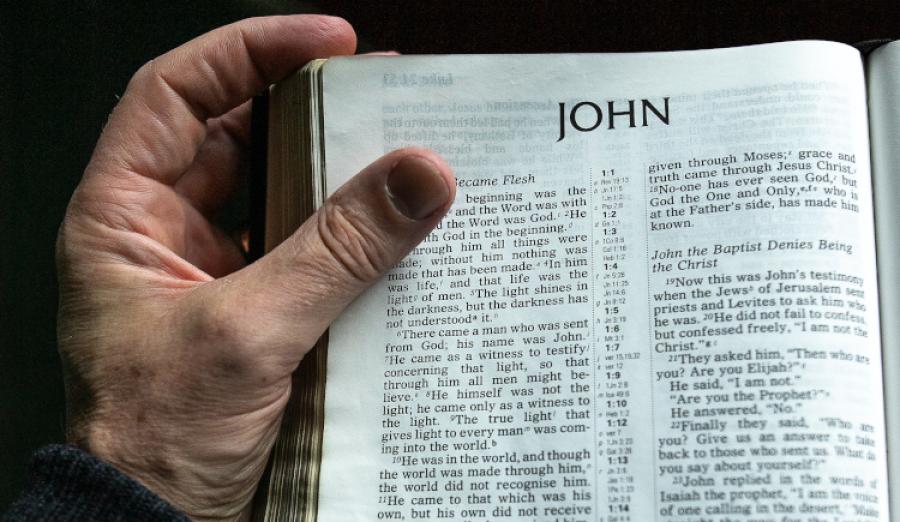The Preeminence of Christ the Logos in John’s Prologue
Image

Although it is not an annunciation story, it is proper to include here some thoughts about how John begins his Gospel. John self-consciously invokes the creation narrative, but he introduces the “only begotten Son” (Jn. 1:18), Jesus Christ (Jn. 1:17), as the Logos or “Word” as a Principal in the making of the world:
In the beginning was the Word, and the Word was with God, and the Word was God. He was in the beginning with God. All things were made through Him, and without Him nothing was made that was made. (John 1:1-3)
Here the Logos1 is no incidental actor in the Creation Project. He is there at the very beginning of everything. Before Adam, before angels, the Word was present, and He was together “with God.” Verses 14 and 18 make it clear that “God” in the Prologue is God the Father, with the exception of the last part of John 1:1—“and the Word was God.” In that place this Logos is apart from God but is Himself designated as deity.
This either means there are two “Gods,” or it means that God is a plurality: one Being but with more than one “expression.” That is, the apostle declares at the start of his Gospel that the God of the OT is at least a plurality of “Persons” in a single essence.2 And this Word, who John will go on to identify as “Jesus,”—although prior to His being born into the world (Jn. 1:17)—is the one through whom God (the Father) made everything.
This introduction of Christ forms a stark contrast to the infancy narratives in Matthew and Luke, although it must be said that both of those writers do include a reference to Jesus’ deity (Lk. 1:32, 35; Matt. 1:23). The one who is born into lowly circumstances in Bethlehem, Judah, and who grows up in obscure Nazareth in Galilee, is the Creator of the land and the sea, the plants and the animals, and of human beings. Jesus is the eternal God but He is born into time and space. The Prologue continues:
In Him was life, and the life was the light of men. (John 1:4)
This verse makes the claim that the Logos of God is the source of the life of men. This would be natural enough to infer since the varied concepts which the Greek term Logos represented; Word, Reason, world-constructive intelligence, etc., presuppose Life in its highest possible expression. We must not, however, allow ourselves to associate John’s use of Logos with the purely Greek philosophical idea. In saying that the Logos is divine and personal John knows he is going beyond Greek philosophy.
Some scholars believe that John might have been influenced by the rabbinic term memra, which is often used in the Targum to refer to God’s word of power. But this is disputed by many. A. T. Lincoln argues that besides uses of memra after the time of John’s Gospel, only in a very few cases is itemployed to refer to God’s revelatory activity. Hence, it is doubtful whether John would have been well acquainted with its use in the same sense.3 Lindars claims there is little in common between memra and John’s Logos because memra “is a stylistic device to soften anthropomorphisms of the OT, so that ‘the word of the Lord’ is simply a synonym for ‘the Lord.’”4
As a matter of fact, it seems far more likely that he had in mind the dabar Yahweh or Word of God.5 The Hebrew term dabar could function similarly to the Greek logos.6 It would therefore not be a stretch for John to equate the two and fashion it in order to apply it to God’s Son, who became incarnate.
So, John already has the Logos as the divine eternal Creator, through whom everything was made, and in whom the life of every human is based. He is the one through whom God can be approached. Not only that, but upon belief “in his name” (Jn. 1:12) a person may attain the inestimable honor of becoming a child of God. A transaction occurs whereby a believer is “born… of God” (Jn. 1:13).
Notes
1 I will use the terms Logos and Word interchangeably in this chapter because John’s use of Logos requires some explanation. For a fuller examination, see Paul Martin Henebury, “Jesus Christ, The Logos of God: An Inquiry into the Johannine Prologue and Its Significance,” Conservative Theological Journal, 8.23 (March 2004).
2 I do not intend to drift into systematic theology here. The Christian doctrine of the Trinity has been ably defended and expounded multiple times. My purpose is to come at John’s words in a way that demonstrates the several glories of Jesus in the biblical worldview, and therefore show how He is central to how we ought to think about the world.
3 Andrew T. Lincoln, The Gospel According to Saint John, New York: Continuum, 2005, 95. Cf. James M. Boice, Witness and Revelation in the Gospel of John, Grand Rapids, Zondervan, 1970, 161.
4 Barnabas Lindars, The Gospel of John, NCBC, Grand Rapids: Eerdmans, 1982, 83.
5 Ibid. See also D. H. Johnson, “Logos,” in Dictionary of Jesus and the Gospels, edited by Joel B. Green, Scot McKnight & I. Howard Marshall, Downers Grove, IL: IVP, 1992, 484.
6 See George R. Beasley-Murray, John, WBC, Waco, TX: Word, 1987, 6-10.
Paul Henebury Bio
Paul Martin Henebury is a native of Manchester, England and a graduate of London Theological Seminary and Tyndale Theological Seminary (MDiv, PhD). He has been a Church-planter, pastor and a professor of Systematic Theology and Apologetics. He was also editor of the Conservative Theological Journal (later Journal of Dispensational Theology). He is now the President of Telos School of Theology.
- 128 views


Discussion